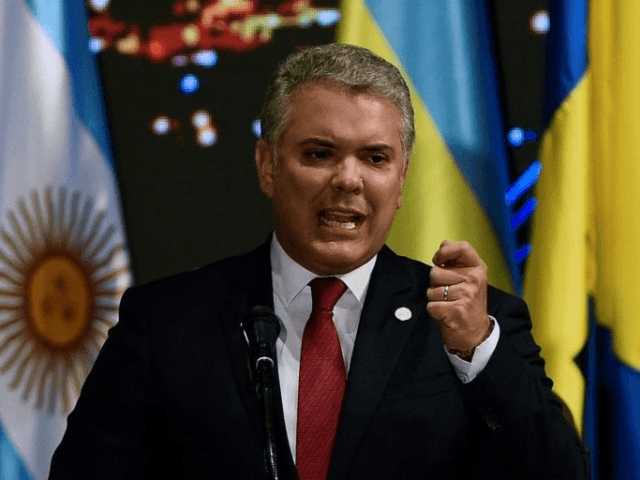A senior member of the Revolutionary Armed Forces of Colombia (FARC), handed a seat in Colombia’s Congress as part of a peace deal, threatened to kill President Iván Duque in a video surfacing Monday.
“Jesús Santrich,” whose real name is Seuxis Pausias Hernández, abandoned his congressional seat in 2019 and took up arms against the government of Colombia alongside several other senior FARC officials who would have otherwise benefited from the peace deal. FARC, a U.S.-designated terrorist organization heavily involved in narcotics trafficking, is believed to be responsible for over a quarter of a million known deaths in over half a century of failed attempts to overthrow the Colombian government.
Santrich’s whereabouts remain unknown, though Colombian intelligence officials believe him to be hiding in Venezuela, a longtime FARC ally. The video in which he threatens Duque, a conservative who ran against the peace deal legacy of predecessor Juan Manuel Santos, was published on Monday by Colombian news outlet NTN24.
“Memento mori,” Santrich said in the video, a Latin phrase meaning “remember that you will die.” “Every fat pig gets his December.”
In Hispanic culture, a full roast pig is a traditional Christmas Eve dinner.
Santrich urges communists and other leftist supporters “keep struggling for true peace with social justice” and, elsewhere in the video, complains that Twitter had censored the terrorist group’s Twitter account, blaming the “censorship” on Duque personally.
NTN24 dated the video to have been filmed nine days before it was published, or on February 13.
Duque responded to the video by vowing to continue to fight Marxist terrorism.
“I am not afraid of threats from delinquents,” Duque said in a statement. “We will keep fighting them ceaselessly in defense of the Colombian people.”
Santrich was one of the top leaders tasked with negotiating a peace deal with the Santos government, which came to fruition in 2016. The deal, initially signed in Cuba, was constitutionally required to be passed via popular referendum. The Colombian people voted against it, rejecting the reintroduction of the FARC into society with minimal penal consequences for members. In response, Santos implemented the deal through Congress despite the unconstitutional nature of the move. The deal won Santos the Nobel Peace Prize.
The peace agreement, brokered with the help of the communist government of Cuba, granted senior members of the terrorist organization uncontested seats in both chambers of the Colombian Congress. It also created a legal process that invited FARC terrorists to surrender their weapons and be reintegrated into civilian society; the FARC has kidnapped thousands of children in its over 50 years of existence and forced them to become soldiers. Those children, if guilty only of a poorly defined category of “political” crime, could potentially achieve reintegration into society without having to go to prison.
The peace deal did not require the FARC to specify its finances or prove that it had abandoned drug trafficking. Cocaine growing and trafficking was for decades one of the FARC’s major sources of revenue; the terrorists forced farmers in remote areas to work for them or face death. Among the FARC’s other crimes include child abduction, use of child soldiers, sexual crimes against children, forced abortions on children FARC terrorists had raped, the use of land mines, kidnappings for ransom, and other acts of violence.
Under its leader, “Timochenko,” the FARC rebranded in 2017 as a political party and ran candidates nationwide, most of whom lost. Senior FARC leaders like Santrich received congressional seats without having to campaign for them.
Shortly before taking his seat in Congress, Santrich was arrested at the behest of the United States on charges of smuggling ten tons of cocaine into the United States in 2017, the year after the peace deal went into effect. Due to his status as a lawmaker-to-be, Colombia’s Supreme Court ruled that he enjoyed special immunity from prosecution and freed him in May 2019, without ruling on the legitimacy of the charges. Santrich was sworn into the Colombian Congress in June 2019.
A month later, Santrich disappeared, along with Márquez, and Interpol issued an alert for his arrest. The Supreme Court, which had ruled itself the only court with jurisdiction to imprison Santrich, issued an arrest warrant. In September, Santrich appeared alongside Márquez in a video announcing that the FARC had returned to terrorism. While Santrich and Márquez are senior leaders of the group and narco-terrorism is the group’s core activity, mainstream publications refer to them as FARC “dissidents.”
In the video, the group reads a statement demanding Duque’s immediate resignation and accused him of violating the provisions of the Santos peace deal.
“Duque must leave the presidency of the republic early because he is an illegitimate president because the highest office in the nation was too large for him,” the statement read in part. “He wants to generalize chaos by destroying the balance of powers by incurring public contempt and questioning decisions of the Supreme Court of Justice, because it wants to wipe out the social mobilizations that are shaking the country today, and because Colombia does not want the dictatorship.”
Duque had won a presidential election decisively against socialist candidate Gustavo Petro shortly before the statement was broadcast.

COMMENTS
Please let us know if you're having issues with commenting.